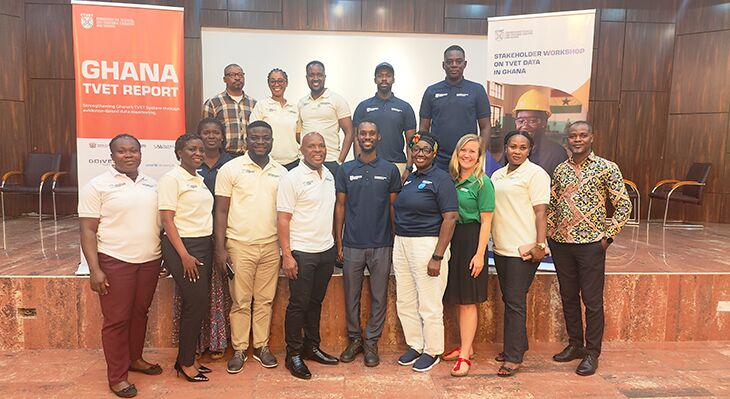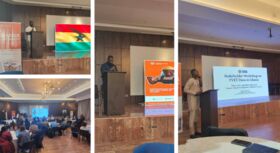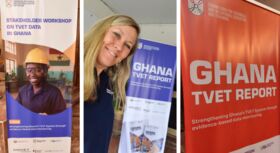Stakeholder workshop on data reporting in Ghana
Evidence-based foundations for vocational education and training attract considerable interest
What data management systems are currently existing for vocational education and training in Ghana? Who collects and publishes data, and how is it used for evidence-based education policy? These and other questions were addressed by participants at the workshop on vocational education and training data in Ghana.

On 24 and 25 September 2025, the stakeholder workshop ‘Strengthening Ghana's TVET System through evidence-based data monitoring’ took place in Accra. The event was organised by the Commission for Technical and Vocational Education and Training (CTVET) in collaboration with GOVET from the Federal Institute for Vocational Education and Training (BIBB) and supported by UNICEF Ghana.
The aim of the workshop was to analyse the data situation in the field of technical and vocational education and training (TVET) in Ghana, identify gaps and develop approaches for more evidence-based reporting.
In order to determine the external efficiency of the TVET system, we need to collect data that enables us to assess the relevance of training for the labour market.
Anthony Seyram Kwame Zu, Deputy Director General of the Commission for TVET (CTVET)

The Ghanaian partner institutions emphasised the importance of reliable data. Mr Kevin Antierku, Ministry of Education; Anthony Kwame Zu, Deputy Director General of the Commission for TVET (CTVET); and Christin Lucille McConnell, UNICEF Ghana, emphasised in their welcoming remarks that reliable data is crucial for targeting vocational education and training, justifying investments and improving the employability of young people.

The two-day event provided an opportunity for intensive exchange between ministries, authorities, universities, social partners and international development organisations.
- Day 1 focused on presentations on existing data systems, such as the Education Management Information System (EMIS) and the Mobile School Report Card (MSRC). In addition, representatives from CTVET, Ghana TVET Service, Accra Technical University, the International Labour Organisation (ILO) and other institutions discussed the relevance of TVET reporting for policy decisions in a panel discussion moderated by GOVET.
- Day 2 was practice-oriented: in working groups, the participants developed proposals for a TVET management information system and infrastructure, indicators for policy advice, communication and processes, among other things. Interactive mapping helped to visualise Ghana's vocational training data landscape and define the next steps.
The workshop marked another important step in German-Ghanaian cooperation in the field of vocational training. Together with the partner institutions, concrete starting points for the further development of the data basis in the Ghanaian TVET system were developed.
As Julia Olesen emphasised in conclusion:
With the right indicators, robust systems and strong partnerships, Ghana can build a vocational training system that serves as a model for the continent.
Julia Olesen, GOVET project manager in the bilateral cooperation with Ghana